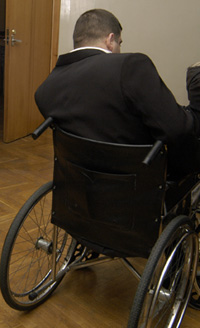There are themes, which are written about in press only in the scopes
of grant projects. As a rule, these themes are not so interesting. The
TV programs and articles, which concern these subjects, are as
uninteresting as those themes are. I mean the articles about the
ecological and social vulnerable problems. Probably the organizations,
which give them grants, know about this, but still they continue to
sponsor them for years. It seems, that their work is effective. Today
our society knows about some problems and is interested in them, and
they are problems that the society didn’t know about before. In 2003
the National Statistics Service of Armenia took a survey of “housing
conditions of needy handicapped people” and it was a grant survey. This
was sponsored by the Central Bureau of Statistics of Sweden. The
results were published this year. The reason for making a long name is
because it must correspond to European standards. Only people from
developed countries could say, that only one part of handicapped is in
need. According to the information of RA’s Ministry of Labour and
Social Issues, 141.4 thousand handicapped are registered in Armenia.
Almost all of them are needy. Also, the statistics point out, that only
55 thousand of these handicapped people (less than the half) are
pension age. By registering an official low level of unemployment, the
government of Armenia did not take care of this problem. The government
pays a 4-7.000 dram subsidy to 86.000 handicapped people and then they
are officially taken out of the unemployment list. This is allowed if,
according to the survey of the statistics service, only 64 of 1125
unemployed handicapped people have jobs. Actually only 6 % of the
handicapped have jobs in Armenia. The handicapped are one of the most
vulnerable groups in the labour market. On the one hand, they are not
protected by special law, and on the other hand they are not
well-educated. Armenia overcame illiteracy way back in 1930 and
officially our country is still educated. But according to the report
of the statistics service, 18 % of the handicapped are illiterate. This
is an extremely high mark, because the number of handicapped that have
brain injuries doesn’t exceed 2 %. Let’s not forget that illiteracy is
becoming younger. This means that the mark of illiteracy of children in
school is higher than all the other age groups. The current secondary
school system doesn’t solve its problems. The government has only two
schools in Yerevan for the handicapped who can’t see or hear well, but
it doesn’t have any schools in the regions. According to the statistics
service report, every fourth handicapped child is illiterate (about 24
%) in the regions of Aragatsotn, Gegharkunik, Tavoush. This vulnerable
group is not included in the forthcoming education reforms. The
government does not take this into consideration, thus it doesn’t save
good money for sure. The number of the registered handicapped children
is not so big in Armenia, even for our small budget and economy. There
were about 8,000 handicapped children registered on July 1, 2005. The
government doesn’t care about them. And this is more of a problem based
on morality than than economy.
The government has organized a couple of programs for these vulnerable
groups. These programs, were foreseen as grant programs, i.e. they were
sponsored either by international institutions or by foreign
governments. These programs were not very effective. According to the
report of the statistics service of Armenia, 24-34 % of the handicapped
(it depends on which region they live in) don’t have any occupation.
The worse ratings are again given to Aragatsotn, Gegharkinik and
Tavoush regions. Usually there are no serious social differences
between the regions of Armenia. The difference of the normal living
standars is described as a result of the climatic differences. Thus, it
is very difficult to understand why there is such a big difference of
education level, for example between Lori and Tavoush regions. The
government doesn’t consider this issue. Of course, it is stated by the
law about education, that the expenses for the secondary or university
education for the handicapped are made by the state budget. Of course,
most of the handicapped cannot use this privilege, because the
government hasn’t provided them with the possibility of elementary and
and secondary education. Also the fact, that the survey, made by Sweden
sponsorship, was published about two years ago, clearly shows how much
the government cares for the problems concerning handicapped people.
Our government doesn’t have resources for these kinds of small
problems. The publication of the report was sponsored by foreigners
too, and the government was faced only with the difficult resposibility
to tax the survey and the publication.

